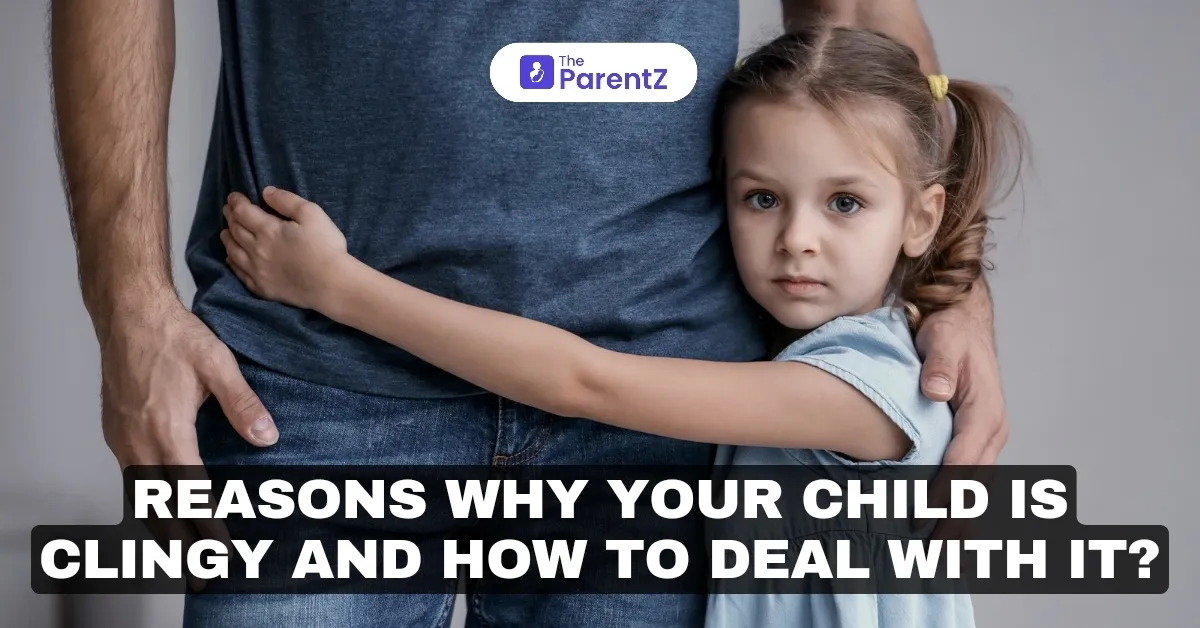Ever come across a situation where your child cries at the thought of you leaving him behind for a few hours?
Are they not able to sleep until you sleep beside them? Or do you find them glued to your legs on every occasion?
If yes, you’ll probably relate to the challenge of having an overly clingy child. In fact, this is the story of several parents. According to the American Academy of Pediatrics, almost 40 percent of kids undergo phases of clinginess. So, the question that arises here is—why is your child acting like a shadow?
What’s more important is learning how you can pry them off! After all, it’s difficult to watch your little one cry their eyes out as you go.
However, you must know that clinginess is a part of development and indicates healthy attachments. Such kids just need some extra reassurance. But it's equally important to know how you can have an impact on your child's behavior and how to manage it.
Read this article to learn how you can deal with an overly clingy child and what the exact reason is behind such behavior from them.
Top Reasons Why Your Child Might Have Clingy Behavior
Here are some of the significant reasons why your child might exhibit clingy behavior.
Separation Anxiety
One of the main causes of clinginess is separation anxiety, which refers to the fear of being apart from you. Your child probably considers you his comfort zone, and staying apart may kick in during stressful moments. Usually, separation anxiety begins between 8 and 14 months and resurfaces occasionally.
Big Changes
Sometimes, certain prominent changes in your kid’s life can also lead to him being overly clingy. Whether you’re moving to a new house or welcoming a new sibling, these reasons might leave your child figuring out everything. Because ultimately, change is hard, not just for these tiny humans but for adults as well. You might give him a love token, such as a family photo or your clothing, to give him comfort even when you’re not around.
Feeling Down
On some days, when your child is not feeling well, it is common for them to behave a little clingy. Whether it’s a mild fever or teething pain, clinginess might be an indication that your child is unwell.
Therefore, it’s important to decode these indications and give your child the comfort they need on those tough days.
Seeking Attention
Kids have the tendency to crave attention from an early age. And clinginess is the best way, according to them, to get away with it. For example, if they need more of your time than the sibling or if they feel ignored, they resort to snuggling into you more tightly.
This is an indication for you to give them their special time solely to him so that they can feel valued too.
Tips To Deal With An Overly Clingy Child
Dealing with overly clingy kids can be hard, but with a gentle approach, it’s easy to do so. Read below to find out some effective tips on how to deal with such kids.
- Stay Patient:
While this is the most sought-after advice, it’s still the most effective. The reason we are saying this is that when your child is extra clingy, it means he needs you. Therefore, it becomes important to stay calm and give them the love and time they seek from you.
- Independence is the Key:
The habit of clinginess generally develops with time. Therefore, you must encourage independence in them from an early age so that they know how to deal with things even if you’re away from them. You can start with short phases initially and gradually increase the time.
- Comfort Items
Giving comfort items to them is a secret hack to ensure your child feels in their comfort zone when you’re apart from them. And whenever they feel clingy, they will most likely comfort them using those comfort pieces.
- Consult Your Doctor:
In rare conditions when things get out of hand even after communication, it is recommended to talk to a child psychologist to help them understand better and what they expect from you.
Conclusion
Overall, clinginess is a normal part of child development. In fact, rather than a concern, it’s more of an opportunity to bond better with your child. By understanding the actual reason behind your child’s clinginess, you can actually figure out how to deal with them without losing patience. And make sure to cherish each and every moment while it lasts.





Be the first one to comment on this story.